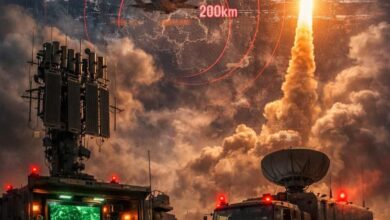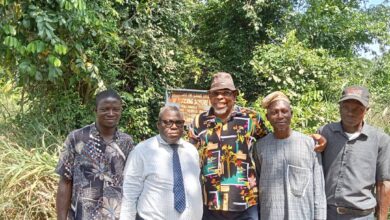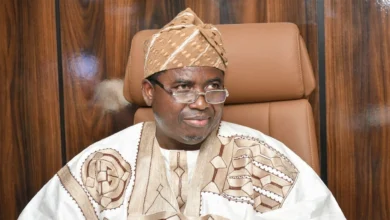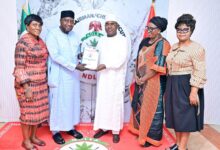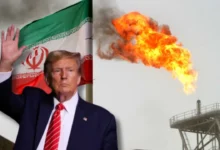SPECIAL REPORT: The Tinubu’s national broadcast address and Ade Dosunmu’s 10-year-old thoughts on growing Nigeria
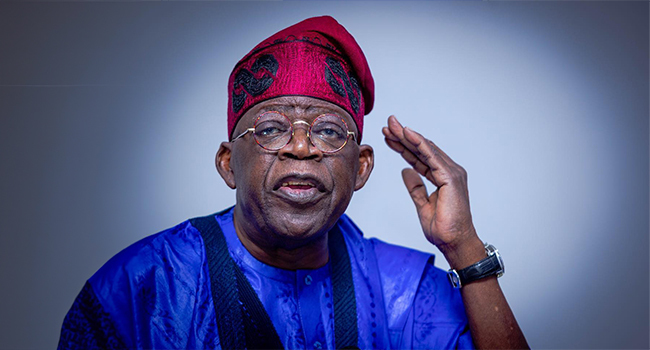
By BASHIR ADEFAKA
“In conclusion, there is a lot of senses in the Ade Dosunmu’s interview for operators of this government to look into. Bigger tthan that was also the Major General Tajudeen Olanrewaju-led Presidential Review Committee that worked and produced the White Paper on Major General Emmanuel Abisoye Panel of 1995 for the unbundling of Nigerian National Petroleum Corporation (NNPC), which is now being implemented.”
Evening of Tuesday July 31, 2023 was the scheduled time for President of world’s most populous black nation, Nigeria, Bola Ahmed Tinubu to do the almost difficult task of addressing an already charged population of over 200 million people now groaning in abject poverty.
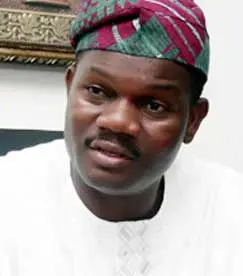
They are poor not because they cannot work. Unproductiveness cannot be used to describe a population that is demographicaly estimated at 60 percent able bodied people, youth. The multi-level poverty that has settled, afflicting everyone since return to democracy in 1999 – till date – is simply the function of government policies’ implementations failure, where over the years such implications are done without prepared hardship preventive measures or side-effect mitigation mechanisms.
The setback the nation’s industrial hub of the old has faced tells it all. Tinubu is from the defunct Western Region and he should be asked what has he found out happened to the Cocoa Board and the Cocoa Depot on Oba Akran Avenue Ikeja and first Nigerian 25-storey building, the Cocoa House Ibadan. Now, as Yoruba man with chance to rule Nigeria, which the achiever of those legacies of the old – Chief Obafemi Awolowo – could not have, how is he planning to revive that segment of the economy since Cocoa remains a cash crop still doing well in the international market?
Another question we should ask is, what happened to the Arewa Textile Mills Kaduna, United Nigerian Textile Mills in Keja and others including all the components of the Cotton-Textile-Garment (CTG) value chain that had contributed immensely to economy in the past but are now irreparably moribund? The Utagba Uno, Agbor, Delta State and the Araromi-Ore, Ondo State rubber plantations that had hosted Michellin Tyres production company generating a great deal of employment in the past, how did they slip off the hands of Nigeria’s Ministry of Trades, Commerce and Investments that we now become a mono-economy nation with only oil as our source of survival? These are the problems.
Dr. Ade Dosunmu, a former Director General of the Nigeria Maritime Administration and Safety Agency (NIMASA), while responding to a question – “Nigeria was relatively peaceful and secured in the time of our founding fathers. How did we get to where we are?” – in his interview conducted by me as Vanguard journalist headlined, “Insecurity: Where we went wrong” on August 9, 2013, had said among other things that:
“In the early 60s, the population of Nigeria was less than 60 million but now with a population of over 160 million and as the most populous back nation, we should have planned to address things like this.” Dosunmu, also a former Peoples Democratic Party (PDP)’s Governorship Candidate in Lagos State for the 2011 election, called attention of government of the country to the keg of gunpower being sat upon and which was bound to explode one day to come.
In no distant time, the predicted time came with administration of Muhammadu Buhari being the first to bear the brunt of earlier 16 years of neglect, as expectation of him to perform magic and turn the nation’s system into Eldorado rose.
Sadly, what Nigerian critics called ‘frying pan’ from which they chose to jump out under Bruhari has become ‘fire’ as they now claim Buhari is better than Tinubu. Anticipatedly, President Tinubu and his co-travellers, like President Buhari at that time, have had the previous administration to blame. This time, the immediate past and successive administrations are of same All Progressives Congress (APC). So, “nothing spoil” to borrow from the word of “Iya Jomgbo” a comedy radio presenter in Lagos.
The question is now whether Tinubu is the problem? There is divergence of opinions trying to provide answer as they say there can be no straightforward answering it without providing an explanation. Hence some say yes and others say no.
Those who say, “Yes, Tinubu is the problem”, are saying that whereas removing fuel subsidy is not problem as there can be no economic survival for a nation that has fraudulently few pockets of individuals being filled to the detriment of multitude of over 200 million others, taking such decision in haste turned outlandish bbecause “talking came before action:. Palliatives should not only be said to be in place but, more importantly, be seen and felt to be effective before removing fuel subsidy. Reason Buhari rejected IMF urge to remove subsidy.
There is no good in making the masses of the people suffer high degree of heat before finding a means of cooling down their pains. Too priority of government is the security and welfare of the people. Nigerians cry now because they say they had spent the last eight years being patient and that, at the beginning of another era now, they are still being asked to continue to be patient. Some of them have been tempted to prefer even Jonathan government to that under of Buhari and Tinubu.
Those that say “Tinubu is not the problem” have argued that savings from subsidy removal will provide the nation with much more funds to develop other sectors of the economy like continuing, on larged scale, improved infrastructures such as schools, roads and others of President Muhammadu Buhari.
Away from all the arguments, Tinubu himself came on air Tuesday with a profound and painstaking explanation of the state of the economy and did that to the understandability of the layman in the street. This was coming 10 years after Dr. Ade Dosunmu, among other things listed in that interview, had said, “I want to say that the security problem that we have in Nigeria is a product of lack of social security. In developed societies, people, who are not employed, get paid to keep body and soul together.
“In the case of Nigeria, such people may not necessarily be paid but holistic measures should be put in place to empower them to be able to do things for themselves. We have very adventurous people here who do not rely on the government. If you look at the population of those in the public service, they are not up to 10 million. What is that compared to the increasing population of Nigerians which now is put at far above 150 million?” Dosunmu said this as far back as August 2013.
But at that time, Nigerian political class was busy building thuggery and mediocre, who are now major controllers of one of most vital segments of the nation’s economic sector – transportation – with further extension into the market places where actions and inactions of those non-state actors determine the price reason principle of principles of demand and supply no longer work in the Nigerian market except in the North.
So the nation’s state appears to have lost its power to the control of hoodlums, who have nothing to contribute to the economy than create fears through forceful exploitation and extortion of hard-earned money of transport operators and inflation falling all over the pace because the non-state actors unleashed on the market place are unexplainably unproductive and would block the way of productive people to function.
What sense is in all that happen on major highways where hoodlums block the roads at will in the mame of collecting taxes from goods carrying trucks, advertisement charges from every vehicle with company’sinscriptions? In a country of King’s and chiefs? What are functions of Police and tax officials recognisable as government agents?
Still on the Dosunmu’s interview 10 years ago, he said, “When government creates enabling environment for industries to thrive, people will be able to establish businesses. Investors will come in and put industries on the ground (in the) country whereby they will help themselves and at the same time help others by way of employment.”
According to him, “The country also has the issue of population explosion on its hands. Yet there is no effective planning to get updated position of our population figure to aid the job of budgeting. How then do we have effective budgeting?
“Before you do budget at all, our national planning office should have been able to know our population accurately, and then forward same to the budget office which will put together the budget that the planning office will use in a way that the generality of Nigerian masses will benefit.”
He said, “See the number of students that seek for admission in Nigerian universities; how many of them actually get admitted? And it is so because there are no adequate facilities in the university environments to accommodate them. In a society where the planning office works effectively, all these should have been detected ahead of time and provisions made for them.”
The target of this media work is where the former DG NIMASA said, “If you also look at the programmes that are run in the universities, many of them are not arranged in accordance to the needs of the industries. You see, where people offer Arabic, Philosophy, Yoruba, etc, which are okay but do not really go with the demands of the industries in need of services off graduates, what you would have is unemployment like we have currently.
“In essence, I am saying that the majority of graduates that our universities are producing nowadays are not employable. What the industries need today in the world is in the range of engineering, medicine and in the arts.
“And effective planning will check this wastefulness from the standpoint of admission to the arrangement of courses and programmes. Students can still be made to study Arabic, philosophy, etc, but not in the higher percentage as may be required of engineering, medicine and others.”
On what he would suggest as panacea for the problems, Dosunmu, who recently defected from his home political party of Peoples Democratic Party ‘to join Asiwaju Bola Ahmed Tinubu and support his presidency to succeed’, said:
“Our government at all levels must take serious look into the issue of planning for our teeming population of young Nigerians who have a lot of energy that should be channelled to productive areas.”
The Tinubu address
Then President Tinubu came with his national broadcast entitled, “AFTER DARKNESS COMES THE GLORIOUS DAWN” and understanding this address becomes a natural duty for the media, which The DEFENDER tries to bring to the clearer understanding of Nigerians.
The irreversible policy of fuel subsidy removal
From a solemn tone, “My fellow citizens”, President Bola Ahmed Tinubu began the speech and said: “I want to talk to you about our economy. It is important that you understand the reasons for the policy measures I have taken to combat the serious economic challenges this nation has long faced.”
This is a tone of a leader, who himself realizes the untold hardship his somewhat hardliner policy of fuel subsidy has afflicted on the people who, otherwise, should not suffer for whatever reason in the face of plenty. If Nigeria’s wealth were being hurled into the ocean every day, there is enough to go round the people for their better welfare.
But the President continued, “I am not going to talk in difficult terms by dwelling on economic jargon and concepts. I will speak in plain, clear language so that you know where I stand. More importantly, so that you see and hopefully will share my vision regarding the journey to a better, more productive economy for our beloved country.”
Then he hit the nail in the bud, “For several years, I have consistently maintained the position that the fuel subsidy had to go. This once beneficial measure had outlived its usefulness. The subsidy cost us trillions of Naira yearly. Such a vast sum of money would have been better spent on public transportation, healthcare, schools, housing and even national security. Instead, it was being funnelled into the deep pockets and lavish bank accounts of a select group of individuals.
“This group had amassed so much wealth and power that they became a serious threat to the fairness of our economy and the integrity of our democratic governance. To be blunt, Nigeria could never become the society it was intended to be as long as such small, powerful yet unelected groups hold enormous influence over our political economy and the institutions that govern it.
“The whims of the few should never hold dominant sway over the hopes and aspirations of the many. If we are to be a democracy, the people and not the power of money must be sovereign,” he said.
According to the President, the administration of predecessor, Major General Muhammadu Buhari, GCFR, saw it coming and so made no provision in the 2023 Appropriation for the subsidy after June this year. He, however, did not add whether Buhari had plan to make palliatives for cushioning effects of the subsidy removal available before implementing it. He could have also shifted it and make a supplementary budget to the National Assembly to enable him fill the gap of subsidy payment should preparation for removal not effective enough by end of June, thus making this fuel subsidy removal purely and entirely Tinubu’s pet project and not that of his predecessor.
He, however, admitted the ownership of this fuel subsidy removal when he said and many would agree with him that, “Removal of this once helpful device that had transformed into a millstone around the country’s neck had become inevitable.”
Then the multiple exchange rate system that had been established, which he said became nothing but a highway of currency speculation. “It diverted money that should have been used to create jobs, build factories and businesses for millions of people. Our national wealth was doled on favourable terms to a handful of people who have been made filthy rich simply by moving money from one hand to another. This too was extremely unfair.
“It also compounded the threat that the illicit and mass accumulation of money posed to the future of our democratic system and its economy.”
Economic reform
He said, “I had promised to reform the economy for the long-term good by fighting the major imbalances that had plagued our economy. Ending the subsidy and the preferential exchange rate system were key to this fight. This fight is to define the fate and future of our nation. Much is in the balance.
“Thus, the defects in our economy immensely profited a tiny elite, the elite of the elite you might call them. As we moved to fight the flaws in the economy, the people who grow rich from them, predictably, will fight back through every means necessary.
“Our economy is going through a tough patch and you are being hurt by it. The cost of fuel has gone up. Food and other prices have followed it. Households and businesses struggle. Things seem anxious and uncertain. I understand the hardship you face. I wish there were other ways. But there is not. If there were, I would have taken that route as I came here to help not hurt the people and nation that I love.”
The economic reform policy of the President is one that is generally welcomed. To move the nation forward from here, it must undergo a thorough restructuring mainly of the economy. To do this, the President should simply go back to the archives of recent files and pick the 2014 Confab Report, dust and rework it for the better. There may be no way forward better than this at the moment. Let each region competitively exploit, harvest its resources, manage them and only remit certain percentage of total earnings to the centre.
Then the palliatives after
“What I can offer in the immediate is to reduce the burden our current economic situation has imposed on all of us, most especially on businesses, the working class and the most vulnerable among us.
“Already, the Federal Government is working closely with states and local governments to implement interventions that will cushion the pains of our people across socio-economic brackets.
“Earlier this month, I signed four (4) Executive Orders in keeping with my electoral promise to address unfriendly fiscal policies and multiple taxes that are stifling the business environment. These Executive Orders on suspension and deferred commencement of some taxes will provide the necessary buffers and headroom to businesses in the manufacturing sector to continue to thrive and expand.
“To strengthen the manufacturing sector, increase its capacity to expand and create good paying jobs, we are going to spend N75 billion between July 2023 and March 2024. Our objective is to fund 75 enterprises with great potential to kick-start a sustainable economic growth, accelerate structural transformation and improve productivity. Each of the 75 manufacturing enterprises will be able to access N1 Billion credit at 9% per annum with maximum of 60 months repayment for long term loans and 12 months for working capital.
“Our administration recognises the importance of micro, small and medium-sized enterprises and the informal sector as drivers of growth. We are going to energise this very important sector with N125 billion.
“Out of the sum, we will spend N50 billion on Conditional Grant to 1 million nano businesses between now and March 2024. Our target is to give N50,000 each to 1,300 nano business owners in each of the 774 local governments across the country.
“Ultimately, this programme will further drive financial inclusion by onboarding beneficiaries into the formal banking system. In like manner, we will fund 100,000 MSMEs and start-ups with N75 billion. Under this scheme, each enterprise promoter will be able to get between N500,000 to N1million at 9% interest per annum and a repayment period of 36 months.
“To further ensure that prices of food items remain affordable, we have had a multi-stakeholder engagement with various farmers’ associations and operators within the agricultural value chain,” he said this and more.
In conclusion, there is a lot of senses in the Ade Dosunmu’s interview for operators of this government to look into. Bigger tthan that was also the Major General Tajudeen Olanrewaju-led Presidential Review Committee that worked and produced the White Paper on Major General Emmanuel Abisoye Panel of1995 for the unbundling of Nigerian National Petroleum Corporation (NNPC), which is now being implemented.
There is no way you can implement such richly packaged White Paper outside of the very man that did it, especwhen he is still very much around. Tinubu should I believe in the institutional memory, I believe in the importance of relying on the wisdom of those who had come before us. Tinubu growing his style along the institutional memory, whereby he sees the importance of relying on the wisdom of those who had come before him, will go a long way in seeing not only his administration but the country through.
A stitch in times,the adage says, saves nine!


